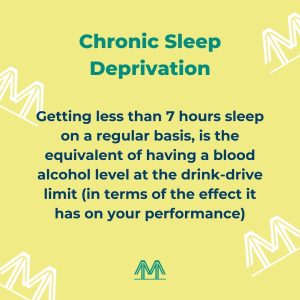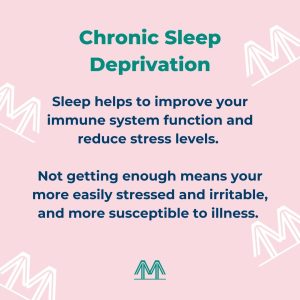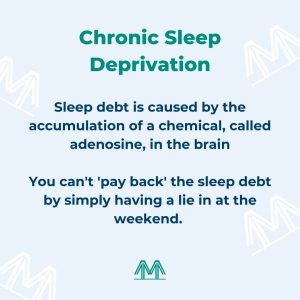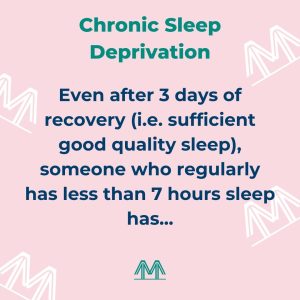I spent years struggling with my sleep. It took a long time for me to master the art of sleeping past 5am and, as a result, it’s a topic I have a lot of personal interest in.
For me, my struggles weren’t in falling asleep. In fact, generally I go out like a light, and I sleep like a log for the time I’m asleep.
However, I would wake up in the early hours of the morning, and be unable to fall back to sleep again.
I wasn’t worrying, as such. I would just naturally wake up. But as I lay there thinking about what I had on that day and what I needed to do once I was up, I would think to myself, “Well, I’m awake anyway, I may as well get up and actually get it done rather than just lie here thinking about it!”.
As time passed and I was regularly getting only a few hours sleep, I would get more and more frustrated with myself. But that didn’t help the problem one bit.
I paid the price later in the day too.
I was often struggling by mid-morning, never mind the mid-afternoon slump!
I learnt to control it by making my bed time earlier, so I was, at least, giving myself the opportunity to get in the hours I needed, before my brain would switch on again at 3am and… ding ding ding… I’d be wide awake.
Suffice to say, I’ve done a lot of research into the topic and in doing so, I’ve found a whole heap of fascinating information about what happens when we sleep.
It’s a topic I cover in more depth in the Guilt-Free Programme. The theme of Month 4 is ‘A High Performing Brain & Body’. As sleep has been described as the most powerful performance enhancer, it’s the ideal time to discuss it. If you’d like to find out more, you can do so here.
If you are someone that struggles with sleep, you’ll know, as well as I do, the effort of having to drag yourself through the day. It’s likely you’ve also struggled with trying to function as best you can, when, really, you’re on your knees.
You do anything you can to get through the day.
You reach for the caffeine, and maybe a hit of sugar to perk you up too. You might even use your favourite tipple as a way to help you relax in the evening in the hope it sends you off into the land of nod.
Equally, you might be someone who is burning the candle at both ends, because there’s so much to pack into your days.
Or perhaps you’re naturally a night owl but then you have to get up early for work; or the kids wake you up waaaayyy before you’re ready to crawl out from under the covers.
Whatever the reason, when it comes to the question of whether sleep deprivation is actually detrimental to your health & performance, you might be interested to know some of the following facts…

That’s right, getting less than 7 hours sleep, in a 24 hour period, has the same impact on your performance as having a blood-alcohol level at the drink drive limit. Now it’s unlikely that you’d get up in a morning, down a couple of pints, and head off to work expecting that you’ll be firing on all cylinders. And yet, it’s likely that you still expect yourself to function as normal, even when you haven’t slept well properly.
Sleep is far from a passive process.
You won’t be aware of it at the time, but your brain and body are busy working away whilst you are asleep. They make sure you can function properly from day to day.
Here’s some of the things they’re up to whilst you’re getting in some shut-eye..



One of the big challenges when it comes to not getting enough sleep is that it has a cumulative effect.
We acquire a sleep debt.
Whilst it can be ‘paid back’, it takes more than just a lie in at the weekend.



This is just a snippet of the understanding we have developed about how and why we sleep.
Through better understanding, scientists and researchers have been able to highlight a number of simple changes we can make to improve our sleep health.
For example, getting outdoors in natural daylight for at least 20 minutes in the day helps to improve alertness and support your natural circadian rhythm.
On the flip side using devices before bed can reduce melatonin levels by more than 50%. Melatonin is the hormone that signals to the body to start the sleep process. Therefore less melatonin delays the onset of sleep. It has also been found to reduce the important REM stage of sleep, making it more likely that you will feel tired the next day. It’s why one of the common bits of advice is to ‘power down’ 60-90 minutes before bed time.
The key thing for me about understanding what is happening in your brain and body, is that it gives you back control over your own health and performance.
When you don’t understand what is causing the frustrating symptoms you are experiencing, it leaves you powerless to change it.
It’s clear to see that sleep is beneficial to our health and performance, and so not getting enough has detrimental effects.
But the point of this isn’t to preach to you, or to make you feel like you must change.
It’s more about offering you the opportunity to check in with what’s currently working for you, and what you would like to be different.
Next comes understanding the cause of the symptom or problem.
Once you’ve got that, it becomes so much easier to identify the simple changes, that will work for you in your unique situation, and have far-reaching impacts on both your health & performance.
Great news!
This is exactly the way I work with my 121 clients and Guilt-Free members:
- Explore what you would like to be different.
- Identify what’s stopping that from happening.
- Uncover and understand the root cause.
- Discover ways to overcome the problem, and so achieve the change you would like.
If you’d like to know more about how I do this, click here to find out more .




